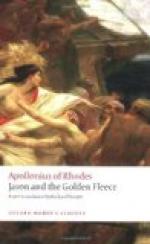Now as soon as the heroes saw the blaze of a torch, which the maiden raised for them as a sign to pursue, they laid their own ship near the Colchian ship, and they slaughtered the Colchian host, as kites slay the tribes of wood-pigeons, or as lions of the wold, when they have leapt amid the steading, drive a great flock of sheep huddled together. Nor did one of them escape death, but the heroes rushed upon the whole crew, destroying them like a flame; and at last Jason met them, and was eager to give aid where none was needed; but already they were taking thought for him too. Thereupon they sat to devise some prudent counsel for their voyage, and the maiden came upon them as they pondered, but Peleus spake his word first:
“I now bid you embark while it is still night, and take with your oars the passage opposite to that which the enemy guards, for at dawn when they see their plight I deem that no word urging to further pursuit of us will prevail with them; but as people bereft of their king, they will be scattered in grievous dissension. And easy, when the people are scattered, will this path be for us on our return.”
Thus he spake; and the youths assented to the words of Aeacus’ son. And quickly they entered the ship, and toiled at their oars unceasingly until they reached the sacred isle of Electra, the highest of them all, near the river Eridanus.
But when the Colchians learnt the death of their prince, verily they were eager to pursue Argo and the Minyans through all the Cronian sea. But Hera restrained them by terrible lightnings from the sky. And at last they loathed their own homes in the Cytaean land, quailing before Aeetes’ fierce wrath; so they landed and made abiding homes there, scattered far and wide. Some set foot on those very islands where the heroes had stayed, and they still dwell there, bearing a name derived from Apsyrtus; and others built a fenced city by the dark deep Illyrian river, where is the tomb of Harmonia and Cadmus, dwelling among the Encheleans; and others live amid the mountains which are called the Thunderers, from the day when the thunders of Zeus, son of Cronos, prevented them from crossing over to the island opposite.




